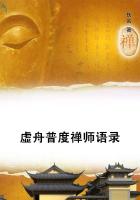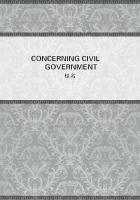In the face of the revolution, all old animosities were forgotten.Compared with the hordes of peasants, the servants of the Roman Sodom were innocent lambs, sweet-tempered children of God.Burgher and prince, noble and clergyman, Luther and the pope united "against the murderous and plundering hordes of the peasants." "They should be knocked to pieces, strangled and stabbed, secretly and openly, by everybody who can do it, just as one must kill a mad dog I" Luther cried."Therefore, dear gentlemen, hearken here, save there, stab, knock, strangle them at will, and if thou diest, thou art blessed; no better death canst thou ever attain." No false mercy was to be practised in relation to the peasants."Whoever hath pity on those whom God pities not, whom He wishes punished and destroyed, shall be classed among the rebellious himself." Later, he said, the peasants would learn to thank God when they had to give away one cow in order that they might enjoy the other in peace.Through the revolution, he said, the princes would learn the spirit of the mob which could reign by force only."The wise man says: 'Cibus, onus et virgam asino.' The heads of the peasants are full of chaff.They do not hearken to the Word, and they are senseless, so they must hearken to the virga and the gun, and this is only just.We must pray for them that they obey.Where they do not, there should not be much mercy.Let the guns roar among them, or else they will make it a thousand times worse."It is the same language that was used by our late socialist and philanthropic bourgeoisie, when, after the March days the proletariat also demanded its share in the fruits of victory.
Luther had given the plebeian movement a powerful weapon -- a translation of the Bible.Through the Bible, he contrasted feudal Christianity of his time with moderate Christianity of the first century.In opposition to decaying feudal society, he held up the picture of another society which knew nothing of the ramified and artificial feudal hierarchy.The peasants had made extensive use of this weapon against the forces of the princes, the nobility, and the clergy.Now Luther turned the same weapon against the peasants, extracting from the Bible a veritable hymn to the authorities ordained by God -- a feat hardly exceeded by any lackey of absolute monarchy.
Princedom by the grace of God, passive resistance, even serfdom, were being sanctioned by the Bible.Thus Luther repudiated not only the peasant insurrection but even his own revolt against religious and lay authority.He not only betrayed the popular movement to the princes, but the middle-class movement as well.
Need we mention other bourgeois who recently gave us examples of repudiating their own past?
Let us now compare the plebeian revolutionary, Muenzer, with the middle-class reformist, Luther.
Thomas Muenzer was born in Stolberg, in the Harz, in 1498.It is said that his father died on the scaffold, a victim of the wilfulness of the Count of Stolberg.In his fifteenth year, Muenzer organised at the Halle school a secret union against the Archbishop of Magdeburg and the Roman Church in general.His scholarly attainments in the theology of his time brought him early the doctor's degree and the position of chaplain in a Halle nunnery.Here he began to treat the dogmas and rites of the church with the greatest contempt.At mass he omitted the words of the transubstantiation, and ate, as Luther said, the almighty gods unconsecrated.
Mediaeval mystics, especially the chiliastic works of Joachim of Calabria, were the main subject of his studies.It seemed to Muenzer that the millennium and the day of judgment over the degenerated church and the corrupted world, as announced and pictured by that mystic, had come in the form of the Reformation and the general restlessness of his time.He preached in his neighbourhood with great success.In 1520 he went to Zwickau as the first evangelist preacher.There he found one of those dreamy cbiliastic sects which continued their existence in many localities, hiding behind an appearance of humility and detachment, the rankly growing opposition of the lower strata of society against existing conditions, and with the growth of agitation, beginning to press to the foreground more boldly and with more endurance.It was the sect of the Anabaptists headed by Nicolas Storch.The Anabaptists preached the approach of the Day of judgment and of the millennium; they had "visions, convulsions, and the spirit of prophecy." They soon came into conflict with the council of Zwickau.Muenzer defended them, though he had never joined them unconditionally, and had rather brought them under his own influence.The council took decisive steps against them, they were compelled to leave the city, and Muenzer departed with them.This was at the end of 1521.
He then went to Prague and, in order to gain ground, attempted to join the remnants of the Hussite movement.His proclamations, however, made it necessary for him to flee Bohemia also.In 1522, he became preacher at Altstedt in Thuringia.Here he started with reforming the cult.Before even Luther dared to go so far, he entirely abolished the Latin language, and ordered the entire Bible, not only the prescribed Sunday Gospels and epistles, to be read to the people.At the same time, he organised propaganda in his locality.People flocked to him from all directions, and soon Altstedt became the centre of the popular anti-priest movement of entire Thuringia.
Muenzer at that time was still theologian before everything else.













